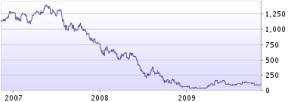Can Britain’s pub scene take another Punch?
It started out so well for Punch Taverns, Britain’s leading pub company (pubco). When it was set up in 1997 as the divested Bass Brewers’ pub estate, the company witnessed a steep rise thanks to numerous expansions through acquisitions, a listing on the London Stock Exchange in 2002 and the purchase of the former competitor Pubmaster in 2003 for GBP 1.193 billion (EUR 1.3 billion).
But every success has its price, especially when it is built on risky financial engineering, ironically called "securitisation". Today Punch Taverns is still the market leader in the UK with a market share of 14 percent (down from 20 percent at its peak) and more than 7,600 pubs in its leased and managed estates, but its business model did cost Punch dearly: despite a massive debt reduction, the group is still struggling under GBP 3.47 billion (EUR 3.9 billion) in debt taken on when it acquired one pub after another.
Enter the financial crisis.
Now Punch Taverns is planning a GBP 45 million overhaul of Spirit, which it bought in 2005 and which has been functioning as its managed pubs division, and a disposal of many more of its still 835 managed pubs.
Apparently, the group is trying to come up for air by reducing debt and cutting annual dividends.
On 14 October 2009, Giles Thorley, CEO of Punch Taverns presented the group’s full year results for the financial year ended 22 August 2009. The company had to write down GBP 663 million (EUR 738 million) on the value of its pubs. That doesn’t bode well, with debt still standing at five times the group’s value.
Sales dropped 8 percent to GBP 1.6 billion (EUR 1.7 billion) during the past financial year, while pre-tax loss quintupled to GBP 406 million (EUR 452 million).
Yes, these are hard times for Punch’s investors. Share price at rock bottom and no dividends. But who said that these pub retail outfits were no high risk investment? Well, they did not tell you that, did they?
At least Punch Taverns is in good company: its rise and fall is somehow exemplary for the whole of the UK’s pub sector. Other pubcos like Enterprise Inn are hardly faring much better.
The UK beer market has undergone dramatic changes over the past few years: the rise of bottled and canned beer over draught, price hikes in pubs, falling alcohol consumption – that certainly puts some pressure on Britain’s pub industry, where closure are running at about 52 pubs a week.
As BRAUWELT International online reported in September 2009, the Campaign for Real Ale (CAMRA), a British beer lobby group, blames the so-called Beer Tie, under which tenants are forced to buy beer from their landlords, for eventually encouraging people to shun pubs in favour of cheaper booze at home.
CAMRA submitted a complaint to the Office of Fair Trading (OFT) in July this year in which they claimed that the Beer Tie was putting tenants out of business in the long run as pubcos charged them above-market prices (according to Mike Benner, CAMRA’s Chief Executive, by about 50 pence a pint or EUR 0.56) which they had to pass on to the consumer.
In its reply dated 22 October 2009, the OFT argued that the extent of higher prices in tied pubs was marginal - about 8 pence/EUR 0.09 on average - and refused to act on this matter.
Now CAMRA are calling on the British Government to take immediate action to protect landlords and consumers alike from the – in their opinion – anti-competitive and unfair arrangements.
With the next general election due in 2010, CAMRA might stand a chance, provided the Government does not decide to lend its ear to the anti-alcohol lobby instead.


